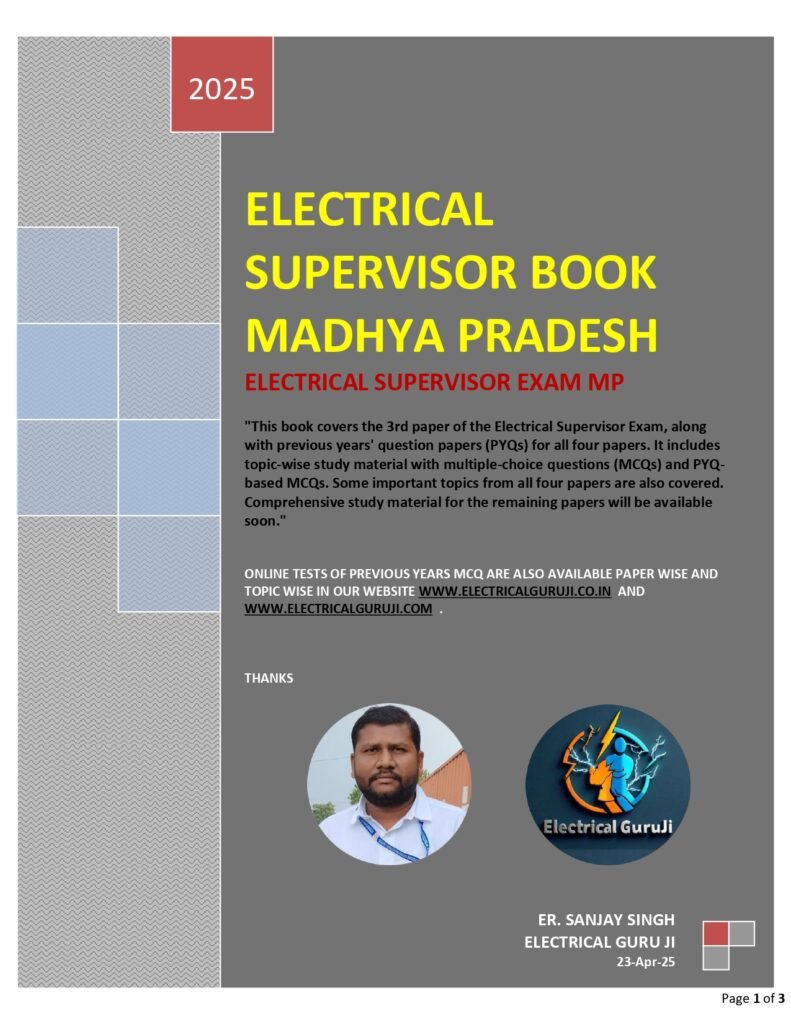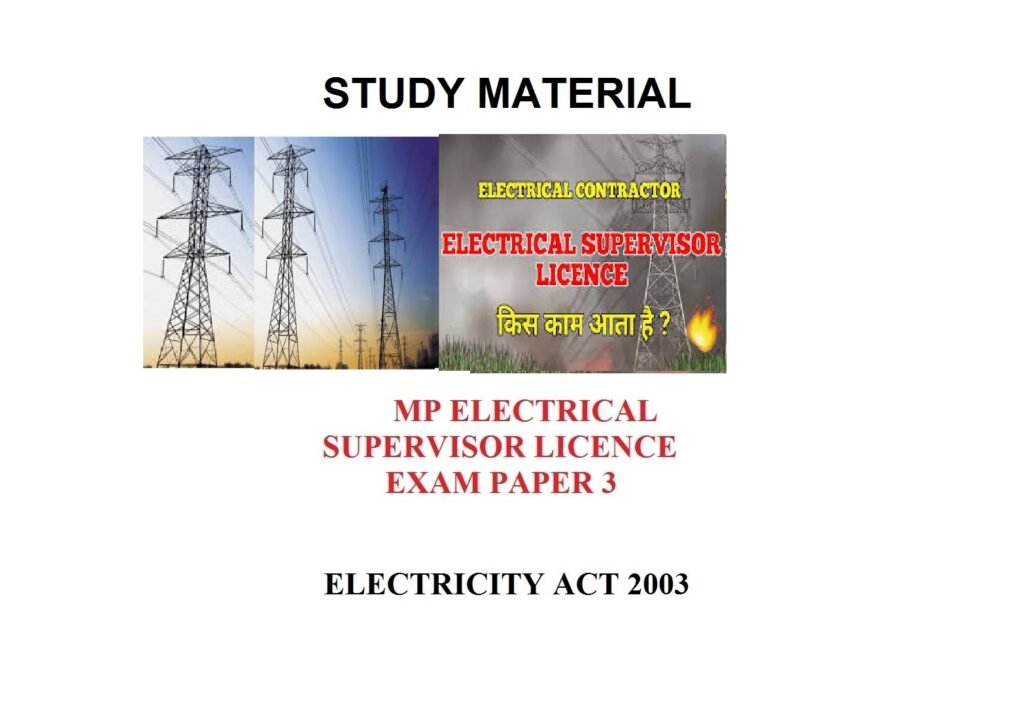Electricity Act 2003 MCQ Quiz
1. Electricity Act 2003 & Regulations
Q1. Which section of the Electricity Act, 2003 relates to the Power of State Govt. to make rules?
Answer: B) Section 176
Section 176 of the Electricity Act, 2003 empowers the State Government to make rules for carrying out the provisions of the Act.
Exam Tip: Remember that Section 180 deals with powers of the Central Government, while Section 176 is for State Governments.
Q2. Section 161 of the Electricity Act, 2003 relates to:
Answer: B) Recovery of penalties as arrears of land revenue
Section 161 states that any penalty not paid can be recovered as arrears of land revenue.
Exam Tip: Section 135 deals with theft, and Section 151 covers adjudicating officers.
Q3. Which section relates to theft of electric lines and materials?
Answer: D) Section 150
Section 150 penalizes theft of electric lines and materials (imprisonment up to 3 years or fine or both).
Exam Tip: Section 135 is for electricity theft, while Section 136 covers unauthorized use.
Q4. Which section of the Electricity Act, 2003 relates to Assessment?
Answer: A) Section 126
Section 126 deals with assessment of unauthorized use of electricity by the assessing officer.
Exam Tip: Section 127 provides the appeal process against assessment orders.
2. Penalties & Legal Consequences
Q5. Who shall be punishable with imprisonment for a term which may extend to three months if they fail to comply with an order under the Electricity Act, 2003?
Answer: C) Any person
Under Section 188, non-compliance with orders can lead to imprisonment up to 3 months or a fine.
Exam Tip: This applies to any person, including licensees or consumers.
Q6. Theft of electricity is constituted under which section of the Electricity Act, 2003?
Answer: B) Section 135
Section 135 defines theft of electricity (punishable with imprisonment and fine).
Exam Tip: Section 138 covers penalties for non-compliance with directions.
3. Licensing & Regulatory Provisions
Q7. A "transmission licensee" means a licensee authorized to establish or operate:
Answer: B) Transmission lines
Defined under Section 2(72) of the Electricity Act, 2003.
Exam Tip: A distribution licensee (Section 2(17)) handles supply to consumers.
Q8. A distribution licensee must supply electricity to an applicant within how many months?
Answer: A) 1 month
Section 43 mandates supply must be provided within 1 month in urban areas and 3 months in rural areas.
Exam Tip: Remember exceptions for rural areas.
4. Disconnection & Unauthorized Use
Q9. A licensee can disconnect supply for non-payment after giving how many days' notice?
Answer: B) 15 days
Section 56 mandates a 15-day clear written notice before disconnection.
Exam Tip: No disconnection if payment is made before the due date.
Q10. If unauthorized use of electricity cannot be ascertained, the period is limited to:
Answer: B) 6 months
As per Section 126, the maximum period for assessment is 6 months preceding the inspection.
Exam Tip: The assessing officer determines the liability.
5. Appeals & Grievances
Q11. What is the time limit to appeal against an assessment order under Section 126?
Answer: B) 30 days
Section 127 allows 30 days to appeal to the appellate authority.
Exam Tip: The appellate authority may condone delays up to 30 additional days.
6. Definitions & Key Terms
Q12. A "stand-alone system" refers to:
Answer: A) Off-grid electricity generation
Defined under Section 2(66) as a system not connected to the grid.
Exam Tip: Common in rural or remote areas.
Q13. A "consumer" is defined under which section?
Answer: A) Section 2(15)
A consumer is any person supplied with electricity for their own use.
Exam Tip: Licensees are excluded from this definition.
7. Inspections & Safety Measures
Q14. Electrical inspectors must be informed of accidents related to:
Answer: C) Electrical fires or fatalities
Section 161(2) requires reporting of accidents causing death or serious injury.
Exam Tip: The inspector investigates such incidents.
8. Power Systems & Distribution
Q15. A stand-alone system is used for:
Answer: B) Rural electrification without grid connection
Common in decentralized renewable energy projects (e.g., solar microgrids).
Exam Tip: Defined under Section 2(66).
9. Provisions & Sections
Q16. Section 7 of the Electricity Act, 2003 deals with:
Answer: A) Licensing for electricity generation
Section 7 allows generating electricity without a license (except for hydro projects).
Exam Tip: Captive generation is covered under Section 9.
10. Qualifications & Roles
Q17. An Electrical Safety Officer must have:
Answer: B) Degree + 3 years experience
As per Central Electricity Authority Regulations, a degree in Electrical Engineering + 3 years of experience is required.
Exam Tip: They ensure compliance with safety standards.
DEMO BOOK ELECTRICAL SUPERVISOR MP 2025
All FOUR PAPERS ELECTRICAL SUPERVISOR STUDY MATERIAL
ELECTRICAL SUPERVISOR BOOK
MADHYA PRADESH
ELECTRICAL SUPERVISOR EXAM MP
“This book covers the All paper of the Electrical Supervisor Exam, along
with previous years’ question papers (PYQs) for all four papers. It includes
topic-wise study material with multiple-choice questions (MCQs) and PYQ based
MCQs.
ONLINE TESTS OF PREVIOUS YEARS MCQ ARE ALSO AVAILABLE PAPER WISE AND
TOPIC WISE IN OUR WEBSITE WWW.ELECTRICALGURUJI.CO.IN AND
WWW.ELECTRICALGURUJI.COM .
MP ELECTRICAL SUPERVISOR LICENCE EXAM





